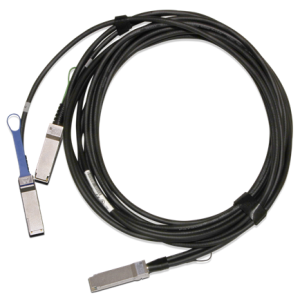Introduction
NVIDIA® MCP7H00-G0xxxxxxx DAC (Direct Attach Copper) splitter cables[1] are a high speed, cost-effective 100GbE to 2x 50GbE Ethernet connectivity solution, designed to meet the growing needs for higher bandwidth in data centers.
The MCP7H00 cables are compliant with SFF-8665 QSFP28 specifications and provide connectivity between system units with QSFP28 port on side end and two QSFP28 ports on the other. The cable connects the data signals from each of the 2 dual copper pairs on the single QSFP28 (pair 1&2, 3&4) end to the dual copper pair of each of the QSFP28 (pair 1&2) ends on the multiport side. Each QSFP28 port comprises an EEPROM providing product information, which can be read by the host system.
The MCP7H00 cables up to 2m support IEEE 802.3by CA-25G-N (Cable Assembly No-FEC) with low latency. Cables with 5m length support IEEE 802.3by CA-25G-L (Cable Assembly Long) with RS-FEC (Reed Solomon Forward Error Correction) enabled. For 2.5m and 3m cables, there are two versions supporting either CA-25G-N or CA-25G-L.
NVIDIA unique-quality cable solutions provide power-efficient connectivity for short distance interconnects. It enables higher port bandwidth, density and configurability at a low cost and reduced power requirement in the data centers.
Rigorous cable production testing ensures best out-of-the-box installation experience, performance and durability.

Images are for illustration purposes only. Product labels, colors, and lengths may vary.
[1] Raw cables are provided from different sources to ensure supply chain robustness.
Key Features
100GbE to 2x50GbE data rate
SFF-8665 compliant QSFP28
Operating case temperature 0-70°C
Single 3.3V supply voltage
Hot pluggable
RoHS compliant
LSZH (Low Smoke Zero Halogen) jacket
LF (Lead Free) HF (Halogen Free) PCB
SFF-8636 compliant I2C management interface